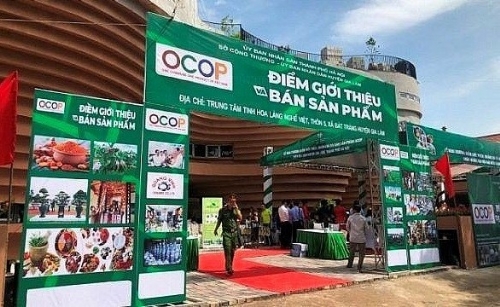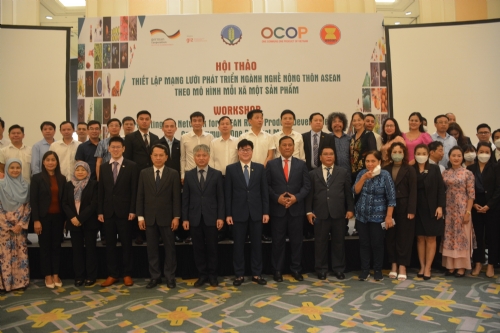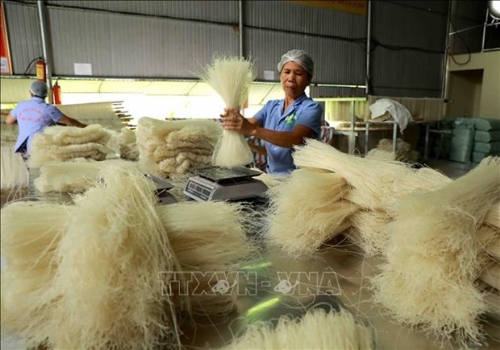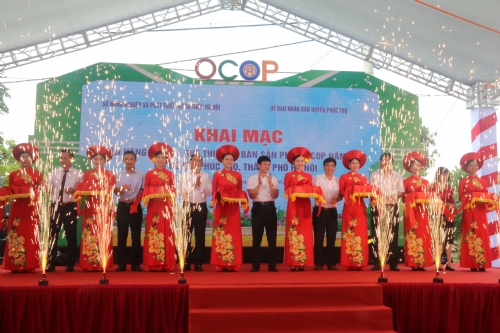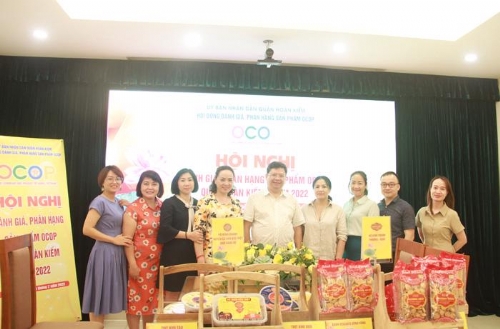Tapping Tourism Potential through OCOP Products
Tuesday, June 2, 2020 11:11

Lao Cai is the second province in the country to approve the One Commune One Product (OCOP) Program. After more than two years of deployment, the province has recognized 52 provincial OCOP products, which is a condition for upgrading the product position, expanding the market, and developing the tourism industry. Thus, the province has offered various preference policies for tourism development and adopted long-term development orientations.
Upgrading local products
According to the Department of Agriculture and Rural Development, the province has more than 220 advantageous products. Particularly, the food category has 115 products; the beverage category 36 products; the herbal category 28 products; the fabric and apparel category 12 products; the souvenir - interior - decoration category nine products and the rural tourism service category 22 products. Producers have established linkages to boost production, consumption, marketing and branding.
The OCOP Program is considered the largest of its kind ever. At present, localities are drafting resolution goals of Party congresses at all levels and objectives of developing key products into OCOP products at all levels.
Mr. Nguyen Anh Tuan, Director of the Lao Cai Department of Agriculture and Rural Development, said, to unlock local potential and develop processed OCOP products, the province has 52 province-level star-certified OCOP products. At present, Ban Lien organic tea is eligible for star-ranking at the national level. The rest is mainly 3-star and 4-star products at provincial level. After products are recognized, product upgrading is taken into account by localities.
These results affirmed the development of key agricultural product chains as an appropriate approach to unlock local strengths, advantages and potential. However, the number of OCOP-certified agricultural products made along the value chain is still modest. The scale and scope of linkages is small. There is no specific and strong policy to encourage and support producers to expand the scale and link up the chain to create products that ensure safety and traceability requirements. Low product quality fails to meet market requirements. Not many businesses and cooperatives have invested in linking chain-based agricultural production to create locomotives and motivations to engage people into the cause, Mr. Tuan said.
Tourism highlights
Bac Ha district of Lao Cai province has diverse and abundant tourism resources, featuring beautiful natural landscapes, cool climate, distinctive cultural identity, and many endemic agricultural products. These are great potential advantages for the district to develop OCOP products to attract tourists. In the coming time, this locality will focus on effectively carrying out the community-based cultural and tourism project in Na Lo village, Ta Chai commune. This is one of 10 pilot villages nationwide to be selected for OCOP Program implementation by the Ministry of Agriculture and Rural Development.
At the same time, Bac Ha will invest in establishing product-specific farming areas (temperate fruit trees, medicinal herbs, organic tea, hi-tech production, etc.) and building community-based and village-based tourist routes linked to agricultural production areas. In addition, the locality will develop local human resources for agricultural tourism. The interest, investment and participation in the OCOP Program will help improve the product level, promote the image of local tourism, increase income for the people toward the course of sustainable tourism development and sustainable rural development.
Ms. Chu Thi Duong, Vice Chairwoman of the Bac Ha People's Committee, said, identifying the OCOP Program is an important solution for agricultural restructuring, production development, new rural development, and socioeconomic development. Therefore, to develop OCOP products in a sustainable way and promote OCOP product brands and strengths, Bac Ha district has been focusing on effective communications to change public awareness of the OCOP Program. Since then, the district has stimulated the sale of OCOP Program joining products, boosted production, and facilitated producers to invest and develop advantageous products of each commune.
In the period to 2030, Bac Ha will complete and upgrade 27 products, develop 22 new products based on local advantages, identify products scalable to other localities rather within a commune or an enterprise, and create products of high quality in large volume to leverage production and socioeconomic development.
Minh Ngoc

 THE PROGRAM COOPERATED WITH CENTRAL COORDINATION FOR NEW-STYLE RURAL DEVELOPMENT
THE PROGRAM COOPERATED WITH CENTRAL COORDINATION FOR NEW-STYLE RURAL DEVELOPMENT
Other news
- HANOI: Promoting the consumption of craft village products and developing community tourism(11/5/2022 3:16:04 PM)
- Chuong My: Effectiveness from the One Commune One Product Program(11/3/2022 10:04:10 AM)
- Thanh Hoa develops OCOP products(11/1/2022 1:30:31 PM)
- Promoting the network for Asia Rural Product Development on one commune one product(8/30/2022 9:43:23 AM)
- Phu Tho eyes 56 new 3-star OCOP products for 2022(8/23/2022 3:09:56 PM)
- Opening of the OCOP product introduction week in Hanoi in 2022 in Phuc Tho district(8/1/2022 3:28:38 PM)
- Evaluation and classification of OCOP products Hoan Kiem District in 2022(7/27/2022 10:10:23 AM)
- Hanoi turns to green, sustainable agricultural sector(6/28/2022 4:10:22 PM)
- OCOP Forum in the Mekong Delta - Dong Thap 2022: Opening up great opportunities for regional products.(5/4/2022 2:38:13 PM)
- Over 1,000 spice products on display in Ho Chi Minh City(4/29/2022 2:34:02 PM)
The featured news
-
HANOI: Promoting the consumption of craft village products and developing community tourism
-
Promoting the network for Asia Rural Product Development on one commune one product
-
Phu Tho eyes 56 new 3-star OCOP products for 2022
-
Opening of the OCOP product introduction week in Hanoi in 2022 in Phuc Tho district
-
Evaluation and classification of OCOP products Hoan Kiem District in 2022


